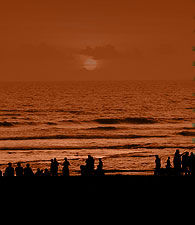Introduction:

Coming with the new moon, the festival marks
the end of 'Ramadan' - a month when Muslims fast throughout the
day and eat only at night Prayers, feasts and family get- together
are the major highlights of the celebrations. It was during this
month that the holy Koran was revealed. Eid means recurring happiness
or festivity. The holy month of Ramadan, the Muslim month of fasting,
is very auspicious to the Muslims the world over.
A very important aspect of eid is the charity,
which all the Muslims are expected to extend to the needy. Earlier,
this was in the form of gifts in kind but now cash is given to
the needy.
The secondary objective of fasting is a way
of experiencing hunger and developing compassion for the needy,
and learn to be thankful and appreciative for all of God's bounties.
Fasting is also advantageous to the health and provides a break
in the cycle of rigid habits.
Celebrated on:
Ramzan or Id -Ul-Fitr is a Musilm festival celebrated
at the end of the Ramadan, the ninth lunar month of the Islamic
Calendar, the day following the appearance of the new moon.
Legends of the Festival:
It is believed that the holy book of Muslims,
the Quran, came into existence during this month. ProphetMohammad
who was an illiterate person was chosen by God to be His messenger
to compile the holy book. The last ten days are specially significant
as the faithful watch for Lailathul Qadr (the Night of Power)
during which the revelation of the book to the Prophet was completed.
Celebrations of the festival:
The tradition is that everyone bathe eatly morning,
wears new or clean clothes and eats dates or some other sweet
before walking to the mosque for Eid prayers. Men wear white clothes
because white symbolises purity and austerity. Community prayer,
generally held in an open space is the most important part in
Ramzan Eid celebrations. Every Muslim is commanded by Koran to
offer Eid prayer with his breathern in full faith. As the congregation
becomes too unwieldy to be accommodated in a mosque spacious grounds
are selected for Community Prayers. It is required that every
Muslim gives alms to the poor and dresses in clean clothes before
attending the public prayer.The Fitr or alms must be a minimum
of two kilos and a half of wheat or any other grain, dates or
grapes. Thus every member of a Muslim household is under religious
obligation to give this Fitr or alms before proceeding to the
ground where Eid Prayer or Community Ibadat is arranged. They
believe that those who do not give alms on this day will not go
to heaven after death.
After the Ibadat or prayer is over, a sermon
is delivered for an hour or so. The preacher then offers extempore
supplementary prayers which are known as `Munajat' to the Almighty
Allah for the welfare of the Muslim faith, remission of sins for
all Muslims. He then comes down from the pulpit, kneels on a prayer
carpet to do "NAMAZ" supplication on behalf of the people.
The congregation at the end of each prayer , rises up and ejaculates
"Faith"- Din.
People spend the rest of the day in feasting,
visiting each other's homes and partake in festive meals with
special dishes, beverages, and desserts. Children receive gifts
and sweets on this happy occasion. In addition, like the pilgrims
in Makkah, the Muslims, who can afford to do so, offer domestic
animals, usually sheep, as a symbol of Ibrahim's sacrifice. The
meat is distributed for consumption to family, friends, and to
the poor and needy. Prayers are offered in mosques and Idgahs
and elaborate festivities are held.
Ramzan Eid is an occasion for a general expression
of goodwill and friendship. Even those who are dead are not excluded
from the benefit of this Eid. So it is a prevalent custom in certain
parts of India for the living wife of a Muslim to offer new clothes
and finery to a former dead wife in a small ceremony which is
known by the name -"SAUKAN MAURA" - which literally
means first wife's crown. The special sweet which is a "must"
and is prepared in every Muslim house is Sheerkurma.
|







